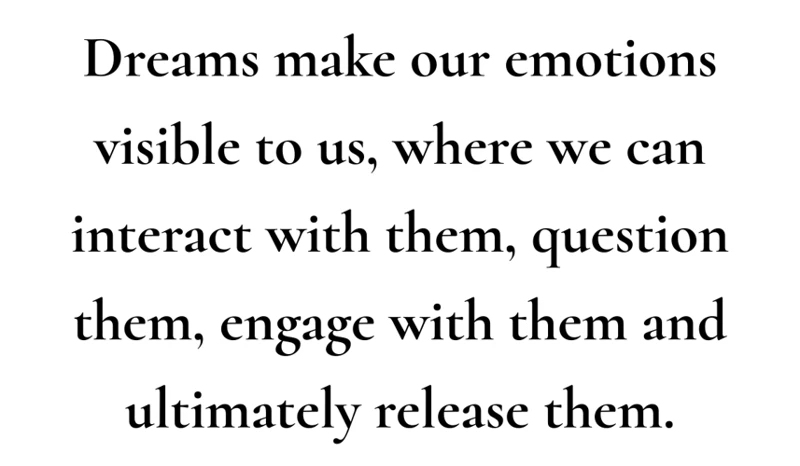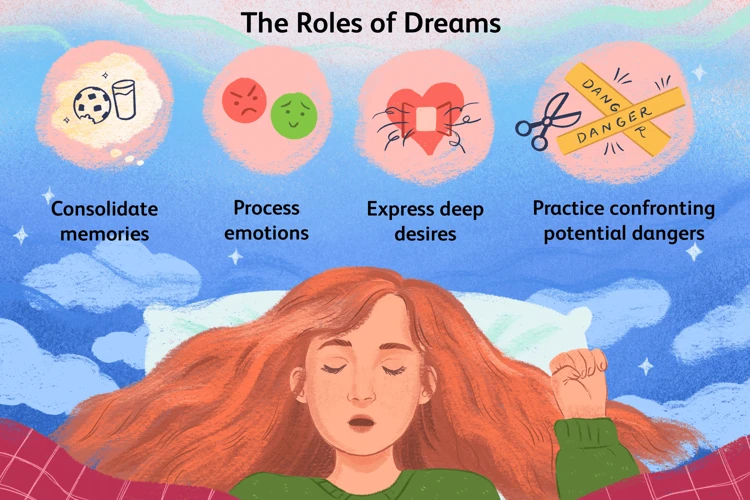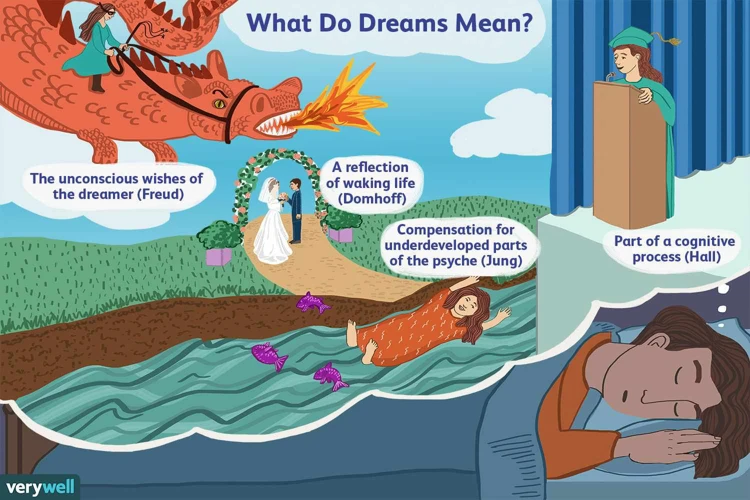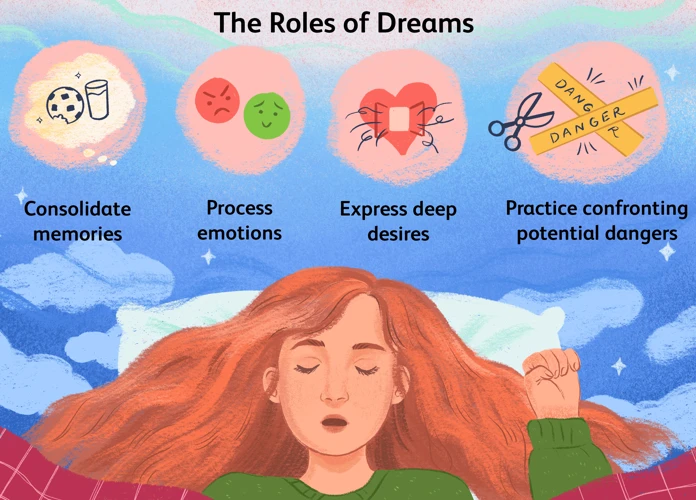The Role of Emotions: Understanding the Emotional Meaning of Dreams
Dreams have long fascinated and perplexed humans throughout history. We find ourselves wondering about their significance and hidden meanings. Are they just a random sequence of images and events or do they hold deeper messages? One aspect of dreams that holds the key to unraveling their mysteries is the role of emotions. Emotions are a powerful tool for understanding the emotional landscape of our dreams and unlocking their true meaning. In this article, we will explore the significance of dreams, the importance of emotions in dream analysis, common emotional themes, and how to interpret emotions in dreams. Whether you are a dream enthusiast or someone seeking personal insight, this article will guide you in understanding the emotional depths of your dreams.
The Significance of Dreams

Throughout history, dreams have held a significant place in human culture, spirituality, and psychology. They have been regarded as portals to the subconscious mind, providing valuable insights and guidance. One of the purposes of dreams is to act as a link between our conscious and unconscious selves, allowing us to process emotions, experiences, and memories. Dreams often serve as tools for problem-solving, offering creative solutions and innovative ideas. They can also help us explore our fears, desires, and aspirations, making them essential for personal growth and self-discovery. By delving into the vast realm of dreams, we can uncover hidden truths, gain self-awareness, and find answers to the questions that perplex us in our waking lives. So, next time you find yourself pondering about the significance of your dreams, remember that they can be a treasure trove of wisdom and insight. [Link anchor: dreams-as-problem-solving]
1.1 Purpose of Dreams
The purpose of dreams is a subject that has fascinated philosophers, psychologists, and spiritualists for centuries. While the exact purpose may still be debated, it is widely acknowledged that dreams serve multiple functions and play a crucial role in our mental and emotional well-being. One of the primary purposes of dreams is to act as a mechanism for processing and integrating our waking experiences. During sleep, our brains consolidate memories, emotions, and events that have occurred throughout the day. Dreams can be seen as a way for our brains to organize this information, make connections, and create new neural pathways. Dreams offer a space for emotional regulation and release. They allow us to explore and process complex emotions, such as fear, sadness, joy, and anger, in a safe and controlled environment. Dreams can also serve as a form of problem-solving, where our minds work through challenges and find creative solutions. In this way, dreams expand our problem-solving abilities beyond the limitations of our waking consciousness. Understanding the purpose of dreams can provide valuable insights into our psyche and enhance our self-awareness. By analyzing the symbols and emotions within our dreams, we can gain a deeper understanding of ourselves and our subconscious desires, fears, and motivations. So, the next time you wake up from a vivid dream, take a moment to reflect on its purpose and the potential messages it may hold. [Link anchor: dreams-as-problem-solving]
1.2 Unconscious Communication
Unconscious communication plays a pivotal role in understanding the emotional meaning of dreams. While we are asleep and our conscious mind rests, our unconscious mind takes the opportunity to communicate with us through the language of dreams. It is through this form of communication that our deepest thoughts, fears, desires, and unresolved emotions make themselves known. The unconscious mind uses symbolic imagery, metaphors, and emotions to convey its messages to our conscious awareness. These messages may reflect our subconscious thoughts and beliefs, helping us gain insights into our innermost selves. Unconscious communication in dreams allows us to tap into the hidden parts of our psyche, bringing awareness to aspects of ourselves that we may not have fully recognized or acknowledged. By deciphering and exploring the symbols and emotions within our dreams, we can unravel the intricate web of our unconscious and illuminate the messages that our dreams hold. [Link anchor: analyzing-dream-symbols-guide]
Understanding Emotions in Dreams

Dreams are not just a random collection of images and events; they are rich in emotions that can provide valuable insight into our inner thoughts and feelings. Understanding the emotional landscape of our dreams is essential for unraveling their deeper meaning. Emotions in dreams can range from intense fear and anxiety to overwhelming joy and happiness. They serve as a reflection of our subconscious mind, revealing hidden desires, unresolved conflicts, and unexpressed emotions. By analyzing the emotions experienced in dreams, we can gain a deeper understanding of ourselves and our psyche. It allows us to tap into the unconscious realm and explore our true thoughts and desires. So, the next time you recall a vivid dream, pay close attention to the emotions you experienced. They might hold the key to unlocking a hidden aspect of your inner world. [Link anchor: analyzing-dream-symbols-guide]
2.1 Emotional Landscape of Dreams
The emotional landscape of dreams is a fascinating realm that provides valuable insights into our subconscious mind. Dreams are not merely a series of random images and events; they are intricately woven with emotions that carry deep meaning. The emotional landscape of dreams encompasses a wide range of feelings, including fear, joy, sadness, anger, and more. These emotions serve as indicators of our inner thoughts, desires, and experiences.
When exploring the emotional landscape of dreams, it is essential to pay attention to the intensity and context of the emotions experienced. For example, feelings of fear and anxiety in a dream may symbolize unresolved fears or insecurities in waking life. On the other hand, dreams filled with joy and happiness can represent a sense of fulfillment or contentment.
The emotional landscape of dreams can act as a reflection of our daily experiences, allowing us to process and make sense of our emotions. It provides a safe space for exploring deep-rooted feelings that we may not be fully aware of in our waking lives. By unraveling the emotions embedded in our dreams, we can gain a deeper understanding of ourselves and potentially uncover hidden emotional patterns or triggers.
Interpreting the emotional landscape of dreams requires careful introspection and self-reflection. It can be helpful to keep a dream journal and record the emotions experienced in each dream. Noting the recurring emotions or patterns can provide valuable insights over time.
Understanding the emotional landscape of dreams is a powerful tool for personal growth and self-discovery. By delving into the depths of our emotions within the dream world, we can gain a better understanding of our subconscious mind and make positive changes in our waking lives. So, the next time you wake up from a dream, take a moment to explore the emotional landscape it presents, and you may uncover hidden truths about yourself. [Link anchor: analyzing-dream-symbols-guide]
2.2 Importance of Emotions in Dream Analysis
Understanding the importance of emotions in dream analysis is crucial for unraveling the true meaning behind our dreams. Emotions serve as powerful indicators of the underlying psychological processes and conflicts that may be playing out in our dreams. When we pay attention to the emotions we experience in a dream, we gain valuable insight into our subconscious thoughts, feelings, and desires. Emotions can provide clues about unresolved issues, suppressed emotions, or even unresolved trauma that we may need to address in our waking lives. For example, feelings of fear or anxiety in a dream may indicate unresolved fears or insecurities that we need to confront. On the other hand, dreams that evoke joy and happiness may signify a sense of fulfillment or contentment. By analyzing the emotional landscape of our dreams, we can better understand ourselves, our relationships, and our deepest desires. It is important to note that emotions in dreams are highly subjective and can vary from person to person. It is essential to consider personal associations and experiences when interpreting the emotions in dreams. [Link anchor: analyzing-dream-symbols-guide]
Common Emotional Themes

Dreams encompass a vast range of emotional landscapes, reflecting the rich tapestry of human experiences. Fear and anxiety are common emotional themes that manifest in our dreams, often representing our subconscious worries and insecurities. Joy and happiness can fill our dreams with warmth and euphoria, capturing the moments of pure bliss that we long for. Sadness and grief, on the other hand, can create a somber atmosphere in our dreams, allowing us to process and heal from emotional wounds. Anger and frustration emerge as intense emotions in dreams, revealing the unresolved conflicts and pent-up frustrations within us. By recognizing these common emotional themes in our dreams, we can gain deeper insights into our emotional well-being and address any underlying issues that require attention. [Link anchor: /analyzing-dream-symbols-guide/]
3.1 Fear and Anxiety
Fear and anxiety are common emotional themes that can appear in our dreams, often reflecting unresolved fears, insecurities, or stressful situations in our waking lives. When we experience fear and anxiety in our dreams, it is important to pay attention to the specific triggers and circumstances surrounding these emotions. Dreams of fear and anxiety can serve as a mirror to our subconscious, highlighting areas in our lives where we feel vulnerable or threatened. These dreams can provide valuable insights into our deepest fears and help us confront and overcome them. It is worth noting that dreams of fear and anxiety can also be an opportunity for personal growth and empowerment. By facing and working through our fears within the realm of dreams, we can develop a sense of resilience and courage in our waking lives. Understanding the emotional meaning of fear and anxiety in dreams can be a powerful tool for self-discovery and healing. [Link anchor: dreams-as-problem-solving]+
3.2 Joy and Happiness
Joy and happiness are emotions that can bring light and positivity to our dream experiences. When we dream of moments filled with joy, we may wake up with a sense of contentment and a smile on our face. These dreams often reflect our inner desires for happiness and fulfillment. They can serve as reminders of the things that bring us joy in our waking lives. Dreaming of joyful experiences can also be a reflection of the emotional state we are in, as our dreams often mirror our current emotions. It is important to pay attention to the details of these dreams, such as the people, places, or activities that bring about the feelings of joy. These details can provide valuable insights into what truly brings us happiness and fulfillment. By recognizing and embracing the joy and happiness in our dreams, we can gain a deeper understanding of ourselves and what truly matters to us. [Link anchor: the-power-of-lucid-dreaming]
3.3 Sadness and Grief
Sadness and grief are powerful emotions that can manifest in our dreams, offering us a unique opportunity to process and heal from emotional pain. In dreams, sadness and grief can be expressed through a variety of symbolic representations or scenarios. These dreams may involve themes of loss, separation, or a sense of longing. For example, one may dream of a deceased loved one or find themselves in a somber setting, surrounded by a prevailing sense of melancholy. The emotions experienced in these dreams can be intense and overwhelming, mirroring the depth of our grief in waking life. However, these dreams can also provide solace and a means for catharsis. They allow us to explore and confront our feelings of loss, offering a safe space to express our emotions and work through the grieving process. A dream involving sadness and grief can serve as a reminder of the need to process and heal from our emotional wounds. It can inspire us to seek support, both in our dream world and in our waking lives, as we navigate the complex journey of grief and find healing and closure. [Link anchor: the-power-of-lucid-dreaming]
3.4 Anger and Frustration
Anger and frustration are common emotional themes that can manifest in dreams. These intense emotions often stem from unresolved conflicts, unexpressed feelings, or challenging situations in our waking lives. When we experience anger or frustration in a dream, it is essential to pay attention to the context and the specific triggers that elicit these strong emotions. For example, dreaming about being angry at someone could indicate unresolved issues or unresolved conflicts with that person in your waking life. Exploring the underlying causes of anger and frustration in dreams can offer valuable insights into our emotional state and help us identify areas of our lives where we may need to work on communication, assertiveness, or conflict resolution. It is important to note that dreams provide a safe space for us to express and process these intense emotions, allowing us to release pent-up anger and frustration in a healthy and cathartic way. By acknowledging and understanding these emotions in our dreams, we can gain a deeper understanding of ourselves and take steps towards resolving conflicts and finding inner peace in our waking lives. [Link anchor: dreams-as-problem-solving]
Interpreting Emotions in Dreams

Interpreting the emotions we experience in our dreams is a vital aspect of understanding their deeper meaning. Emotions in dreams can range from intense fear and anxiety to immense joy and happiness, providing valuable insights into our subconscious thoughts and emotions. One way to interpret emotions in dreams is by recognizing the emotional triggers that evoke certain feelings within us. These triggers could be related to past experiences, unresolved conflicts, or underlying desires. Additionally, identifying our personal emotional associations with specific emotions can shed light on their significance in our dreams. For example, if anger consistently arises in our dreams, it could indicate underlying frustration or unresolved issues in our waking lives. It’s also important to consider the context of the dream and how the emotions relate to the overall narrative. By examining the emotional landscape of our dreams and analyzing the various factors at play, we can gain a deeper understanding of ourselves and uncover valuable insights that can guide us in our waking lives. [Link anchor: dreams-as-problem-solving]
4.1 Recognizing Emotional Triggers
Recognizing emotional triggers in dreams is a crucial step in understanding their deeper meaning and significance. Emotions experienced in dreams often mirror our waking life emotions, but they can also represent unresolved feelings or suppressed emotions. To identify these emotional triggers, pay attention to the intense emotions you felt during the dream and try to connect them to your current or past experiences. Keep a dream journal and write down the emotions you experienced in each dream, along with any relevant details or events. Analyzing patterns and recurring emotions can help uncover subconscious triggers that may be influencing your dreams. It is also important to consider the context of the dream and the specific circumstances in your life that may be contributing to these emotional triggers. By recognizing and acknowledging these emotional triggers, you can gain valuable insights into your deeper emotions, conflicts, and unresolved issues. In some cases, seeking professional help, such as therapy or dream analysis, can aid in understanding and working through these emotions. [Link anchor: the-power-of-lucid-dreaming]
4.2 Identifying Personal Emotional Associations
Identifying personal emotional associations in dreams is a crucial step in understanding the deeper meaning behind them. Each individual has a unique set of experiences, memories, and emotions that shape their dream world. To identify personal emotional associations, it is important to pay attention to the emotions felt during the dream and how those emotions relate to specific events, people, or symbols within the dream. Reflecting on the dream afterwards and journaling about the emotions experienced can help uncover patterns and recurring themes. Connecting these emotions to real-life situations and examining their significance can provide valuable insights into unresolved emotions, desires, or conflicts. By understanding the personal emotional associations within dreams, individuals can gain a deeper understanding of their own psyche and use this self-knowledge for personal growth and healing. Exploring methods such as dream analysis, therapy, or even practices like [Link anchor: the-power-of-lucid-dreaming] can further enhance the process of identifying and interpreting personal emotional associations within dreams.
4.3 Consideration of Context
When interpreting the emotions in our dreams, it is crucial to consider the context in which they occur. The context refers to the overall setting, events, and characters present in the dream. Each dream is unique and can be influenced by various factors such as personal experiences, current situations, and underlying emotions. Analyzing the context helps provide a clearer understanding of the emotional meaning within the dream. For example, if you dream of feeling intense anger towards a friend, it is essential to consider your waking-life relationship with that person. Are there any unresolved conflicts or issues between you? This context can provide valuable insights into the emotional significance of the dream and any potential underlying emotions that need to be addressed. Additionally, considering the overall narrative of the dream can shed light on how different emotions interact and relate to each other. By examining the context, we can gain a deeper understanding of the emotional messages conveyed in our dreams and how they relate to our waking lives. [Link anchor: dreams-as-problem-solving]
Seeking Professional Help
When it comes to understanding the emotional meaning of dreams, seeking professional help can provide valuable insights and guidance. There are various professionals who specialize in dream analysis and can assist in decoding the intricate messages hidden within our dreams. Here are some experts you can consider reaching out to:
1. Dream Analysts: Dream analysts are professionals trained in the interpretation and analysis of dreams. They have a deep understanding of symbolism, archetypes, and the subconscious mind. Consulting with a dream analyst can help unravel the emotional significance of your dreams and provide you with a fresh perspective on your thoughts and emotions.
2. Psychologists: Psychologists, particularly those specializing in dream therapy, can offer a combination of psychological expertise and dream interpretation. They can help you explore the emotional context of your dreams and connect them to your overall mental well-being. Working with a psychologist can be especially beneficial if your dreams are causing distress or interfering with your daily life.
3. Psychotherapists: Psychotherapists delve into the deeper layers of the unconscious mind and can provide valuable insights into the emotional meaning of dreams. They can help you explore any unresolved psychological issues that may be surfacing in your dreams and guide you towards resolving them.
4. Alternative Therapists: Some alternative therapies, such as hypnotherapy or art therapy, can incorporate dream analysis as part of the healing process. These therapists may use techniques like guided visualization or creative expression to help you understand and work with the emotions in your dreams.
Remember that seeking professional help does not indicate weakness or inability to understand your dreams on your own. Rather, it is a proactive step towards gaining deeper insights and making positive changes in your life. Professionals in the field can provide expertise and support in navigating the intricate emotional landscape of your dreams. So, if you find yourself struggling to interpret the emotions in your dreams, don’t hesitate to seek professional assistance. [Link anchor: the-power-of-lucid-dreaming]
Conclusion
In conclusion, understanding the emotional meaning of dreams is a crucial aspect of delving into the depths of our subconscious minds. Dreams offer a unique window into our thoughts, feelings, and experiences, allowing us to unravel the hidden messages they contain. By recognizing the emotional landscape of our dreams and paying attention to the various emotions that arise, we can gain valuable insight into our own unconscious desires, fears, and unresolved issues. Whether it’s the fear and anxiety that permeate our dreams, the joy and happiness that uplift us, the sadness and grief that weigh us down, or the anger and frustration that ignite within us, these emotions are all significant clues to understanding ourselves on a deeper level. Interpreting the emotions in our dreams requires recognizing triggers, identifying personal associations, and considering the context in which the dreams occur. Seeking professional help, such as from a therapist or dream analyst, can provide further guidance in deciphering the emotional meaning of dreams and navigating the complex realm of the subconscious mind. So, embrace the world of dreams, explore the power of lucid dreaming [Link anchor: /the-power-of-lucid-dreaming/], and recognize the potential for dreams to serve as problem-solving tools [Link anchor: dreams-as-problem-solving/]. By honing our understanding of emotions in dreams, we can unlock the hidden treasures of our inner selves and embark on a journey of self-discovery and personal growth.
Frequently Asked Questions
1. How can dreams help us understand our emotions?
Dreams offer a unique window into our subconscious mind, allowing us to access and explore our deepest emotions in symbolic ways. By analyzing the emotions experienced in dreams, we can gain valuable insights into our inner world and better understand our emotional landscape.
2. Can dreams hold any significance or meaning?
Yes, dreams can hold significant meaning. They often reflect our thoughts, feelings, and experiences from our waking lives. They can also offer messages, guidance, and even serve as a way for our minds to process and solve problems.
3. Why are emotions important in dream analysis?
Emotions provide valuable clues when it comes to analyzing dreams. They can indicate the emotional states we are experiencing or repressing, helping us uncover deeper insights about ourselves and our subconscious mind.
4. What are some common emotional themes in dreams?
Common emotional themes in dreams include fear and anxiety, joy and happiness, sadness and grief, as well as anger and frustration. These emotions may manifest in various scenarios, symbolism, or interactions within the dream.
5. How can we interpret emotions in our dreams?
Interpreting emotions in dreams involves recognizing emotional triggers, identifying personal associations with specific emotions, and considering the context of the dream. By reflecting on these factors, we can uncover the emotional meaning and significance behind our dreams.
6. Should we seek professional help to interpret our dreams?
While it is not necessary for everyone to seek professional help, consulting with a therapist or dream analyst can provide valuable guidance and insights. Professionals can offer expertise in dream interpretation and help navigate complex emotions and symbolism within dreams.
7. Can dreams help us problem-solve?
Yes, dreams have the potential to help us problem-solve. They can present us with creative solutions, alternative perspectives, and even highlight issues that require attention in our waking lives. Paying attention to the messages and symbolism in dreams can aid in problem-solving processes.
8. Are there any techniques to enhance dream recall and emotional clarity in dreams?
Yes, techniques such as keeping a dream journal, practicing mindfulness and relaxation before sleep, and engaging in lucid dreaming exercises can enhance dream recall and emotional clarity. These techniques can help in exploring and understanding the emotions experienced in dreams.
9. Can dreams be influenced by external factors, such as stress or daily experiences?
Absolutely, external factors such as stress, daily experiences, and even certain medications or substances can influence the content and emotions experienced in dreams. It’s important to consider the various influences on your dream experiences when interpreting their emotional meaning.
10. Why should we pay attention to our dreams and their emotional significance?
Paying attention to dreams and their emotional significance allows us to tap into our subconscious mind and gain self-awareness. It can provide valuable insights into our emotions, fears, desires, and motivations, leading to personal growth, healing, and a deeper understanding of ourselves.








